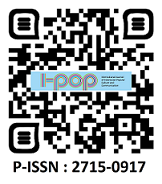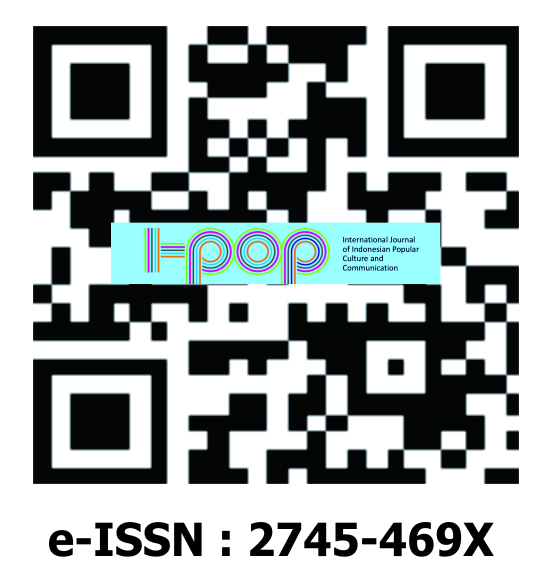Perpetuating Stigma
Representation of Widows and Divorcees (Janda) in Indonesian Popular Media
DOI:
https://doi.org/10.36782/i-pop.v1i1.34Keywords:
widow, divorcee, Indonesian media, representation, jandaAbstract
The image of widows or divorcees (janda) has been negatively portrayed in the various forms of Indonesian popular media. Media critics have shown that media representation contributes to the spread of inaccurate and misleading ideas about janda in societies. This paper discusses the representation of widows and divorcees in mainstream Indonesian films, songs, and news coverage. Through qualitative content analysis of selected Indonesian films, dangdut songs, and news coverage using the word “janda” in the title, this study revealed that stigmatisation continues to occur. It found that janda are often depicted stereotypically across film genres. The appearance of janda in Indonesian film is accompanied by its typical attributes, such as “beautiful”, “rich”, “young”, and “seductive”. The negative representation of janda also found in dangdut songs. Through the title and lyrics, those songs often associate janda as inferior, powerless, or conversely, predatory and sexually seductive. News coverage depicting widows and divorcees, which should be based on facts was found to be excessively biased due to the addition of the journalist’s personal opinion.
Downloads
References
Aliansi Jurnalis Independen (2015). Indikator sensitif gender untuk media: Kerangka indikator mengukur sensitivitas gender pada organisasi dan konten media [Gender-sensitive Indicators for media: Framework of indicators to gauge gender sensitivity in media operations and content]. UNESCO and AJI Indonesia.
Bennett, L. (2005). Women, Islam and modernity: single women, sexuality and reproductive health in contemporary Indonesia. Routledge.
Hall, S. (1997). Representation: Cultural representations and signifying practices. Sage Publications.
Hellwig, T. (2011). Women writing about marriage and sexuality: Post-1998 Indonesian fiction. Asia Research Institute.
Kidd, J. (2015). Representation. Taylor & Francis Group. https://ebookcentral-proquest-com.ezproxy.lib.monash.edu.au
Krippendorff, K. (2013). Content analysis. An introduction to its methodology, 3rd ed. Sage Publications.
Lan, M. (2002). Pers, negara dan perempuan: Refleksi atas praktek jurnalisme gender pada masa orde baru [Press, State and Women: Reflections on the Practice of Gendered Journalism in the New Order]. Kalika, Yayasan Adhikarya IKAPI and Ford Foundation.
Link, B. G. & Phelan, J. C. (2001). Conceptualizing stigma. Annual Review of Sociology 27, 363–85.
Luviana. (2012). Jejak Jurnalis Perempuan: Pemetaan Kondisi Kerja Jurnalis Perempuan di Indonesia. [The Trace of Women Journalists: Mapping the Working Conditions of Women Journalists in Indonesia]. Aliansi Jurnalis Independen.
Mahy, P., Winarnita, M. and Herriman, N. (2016). Presumptions of promiscuity: reflections on being a widow/ divorcee from three Indonesian communities. Indonesia and the Malay World 44(128), 47–67. http://doi.org/10.1080/13639811.2015.1100872
Major, B. and O’Brien, L. T. (2005). The social psychology of stigma. Annual Review of Psychology 56, 393–421.
Murtiningsih, B. S. E. and Advenita, M. (2017). Representation of patriarchal culture in new media: A case study of news and advertisement on Tribunnews.com. Mediterranean Journal of Social Sciences, 8(3), 143-154. http://doi.org/10.5901/mjss.2017.v8n3p143
O’Shaughnessy, K. (2009). Gender, state and social power in contemporary Indonesia: divorce and marriage. Routledge.
Parker, L. (2016). The theory and context of the stigmatisation of widows and divorcees (janda) in Indonesia. Indonesia and the Malay World, 44(128), 7-26. http://doi.org/10.1080/13639811.2015.1100863
Parker, L., Riyani, I. and Brooke, N. (2016). The stigmatisation of widows and divorcees (janda) in Indonesia, and the possibilities for agency. Indonesia and the Malay World, 44(128), 27-46. http://doi.org/10.1080/13639811.2016.1111677
Parker, L. (2003). From subjects to citizens: Balinese villagers in the Indonesian nation-state. Routledge.
Patton, M. Q. (2002). Qualitative research and evaluation methods, 3rd ed. Sage Publications.
Supriyono, D. (n.d). Poster Film Jadoel. Warung Barang Antik. http://warungbarangantik.blogspot.com/ 2010_08_01_archive.html
Romano, A. (2003). Politics and the press in Indonesia: Understanding an evolving political culture. Routledge Curzon.
Romano, A. (1999). Journalistic identity and practises in late New Order Indonesia (Unpublished Doctoral’s Dissertation). Queensland University of Technology, Australia.
Stemler, S. (2001). An overview of content analysis. Practical Assessment, Research & Evaluation 7(17), 137-146.
Subono, N. I. (2003). Menuju jurnalisme yang berperspektif gender [Toward gender-sensitive approach in journalism], Jurnal Perempuan, 28(1), 55-66.
Sundari, A. (2012). Nasib Janda: Representasi janda dalam lagu dangdut [The fate of janda: Representation of janda in dangdut song]. Rifka Media, 5(1), 24.
Talbot, M. (2003). Gender stereotypes: reproduction and challenge. In Janet Holmes and Miriam Mayerholff (eds), The handbook of language and gender. Blackwell.
Wolf, N. (1993). Fire with fire: New female power and how it will change the twenty-first century. Random House.
Yusuf, I. A. (2012). Janda dalam Bingkai Media [Media Framing on Widows and Divorcee]. Rifka Media, 5(1), 19-24.
Yusuf, I. A. (2015). Eksploitasi Sosok Janda dalam Produk Media dan Budaya Populer [Exploitation on Widow and Divorcee in Indonesian Media and Popular Culture]. Proceeding 2nd Conference on Language, Linguistic & Literature (COLALITE) 2015 (pp. 215-228). Purwokerto, Indonesia, November 21, 2015
Weintraub, A. N. (2010). Dangdut Stories: A Social and Musical History of Indonesia's Most Popular Music. Oxford University Press.
White, M. D. and Marsh E. E. (2006). Content Analysis: A Flexible Methodology. Library Trends, 55(10), 22-45. http://doi.org/ 10.1353/lib.2006.0053
Zhang, Y. and Wildemuth, B. M. (2009). Qualitative analysis of content. University of Texas. https://www.ischool.utexas.edu/~yanz/Content_analysis.pdf
Zulminarni, N. (2004). A journey to the world without a husband. In Afrida Purnama et al. (eds), Sebuah dunia tanpa suami [A world without a husband]. Seknas Pekka-PPSW.









